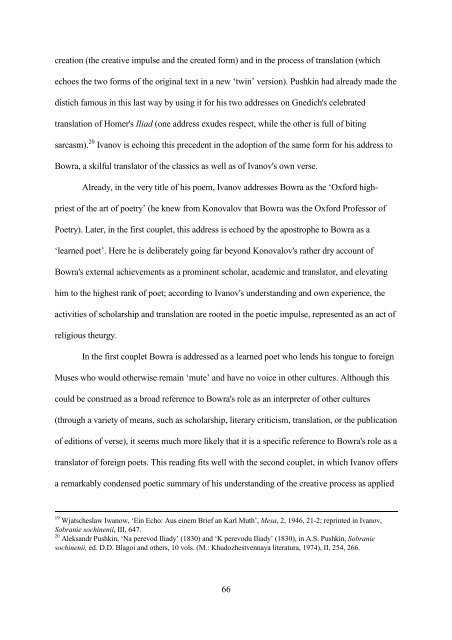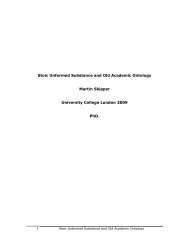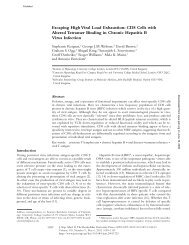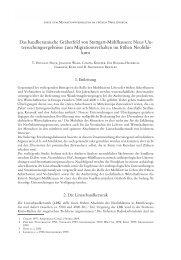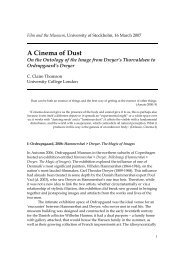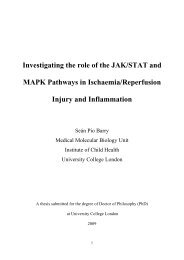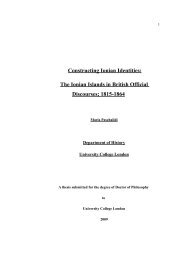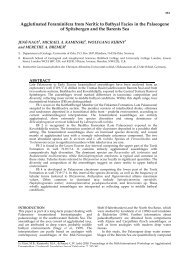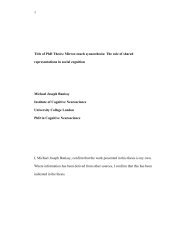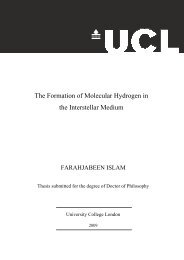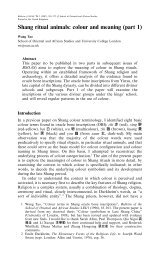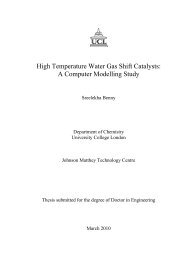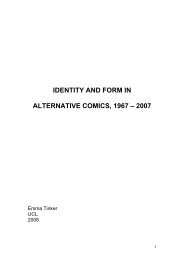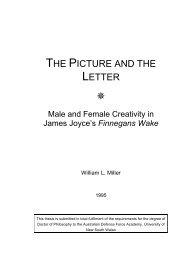Vyacheslav Ivanov and C.M. Bowra: a ... - UCL Discovery
Vyacheslav Ivanov and C.M. Bowra: a ... - UCL Discovery
Vyacheslav Ivanov and C.M. Bowra: a ... - UCL Discovery
You also want an ePaper? Increase the reach of your titles
YUMPU automatically turns print PDFs into web optimized ePapers that Google loves.
creation (the creative impulse <strong>and</strong> the created form) <strong>and</strong> in the process of translation (which<br />
echoes the two forms of the original text in a new ‘twin’ version). Pushkin had already made the<br />
distich famous in this last way by using it for his two addresses on Gnedich's celebrated<br />
translation of Homer's Iliad (one address exudes respect, while the other is full of biting<br />
sarcasm). 20 <strong>Ivanov</strong> is echoing this precedent in the adoption of the same form for his address to<br />
<strong>Bowra</strong>, a skilful translator of the classics as well as of <strong>Ivanov</strong>'s own verse.<br />
Already, in the very title of his poem, <strong>Ivanov</strong> addresses <strong>Bowra</strong> as the ‘Oxford high-<br />
priest of the art of poetry’ (he knew from Konovalov that <strong>Bowra</strong> was the Oxford Professor of<br />
Poetry). Later, in the first couplet, this address is echoed by the apostrophe to <strong>Bowra</strong> as a<br />
‘learned poet’. Here he is deliberately going far beyond Konovalov's rather dry account of<br />
<strong>Bowra</strong>'s external achievements as a prominent scholar, academic <strong>and</strong> translator, <strong>and</strong> elevating<br />
him to the highest rank of poet; according to <strong>Ivanov</strong>'s underst<strong>and</strong>ing <strong>and</strong> own experience, the<br />
activities of scholarship <strong>and</strong> translation are rooted in the poetic impulse, represented as an act of<br />
religious theurgy.<br />
In the first couplet <strong>Bowra</strong> is addressed as a learned poet who lends his tongue to foreign<br />
Muses who would otherwise remain ‘mute’ <strong>and</strong> have no voice in other cultures. Although this<br />
could be construed as a broad reference to <strong>Bowra</strong>'s role as an interpreter of other cultures<br />
(through a variety of means, such as scholarship, literary criticism, translation, or the publication<br />
of editions of verse), it seems much more likely that it is a specific reference to <strong>Bowra</strong>'s role as a<br />
translator of foreign poets. This reading fits well with the second couplet, in which <strong>Ivanov</strong> offers<br />
a remarkably condensed poetic summary of his underst<strong>and</strong>ing of the creative process as applied<br />
19<br />
Wjatscheslaw Iwanow, ‘Ein Echo: Aus einem Brief an Karl Muth’, Mesa, 2, 1946, 21-2; reprinted in <strong>Ivanov</strong>,<br />
Sobranie sochinenii, III, 647.<br />
20<br />
Aleks<strong>and</strong>r Pushkin, ‘Na perevod Iliady’ (1830) <strong>and</strong> ‘K perevodu Iliady’ (1830), in A.S. Pushkin, Sobranie<br />
sochinenii, ed. D.D. Blagoi <strong>and</strong> others, 10 vols. (M.: Khudozhestvennaya literatura, 1974), II, 254, 266.<br />
66


